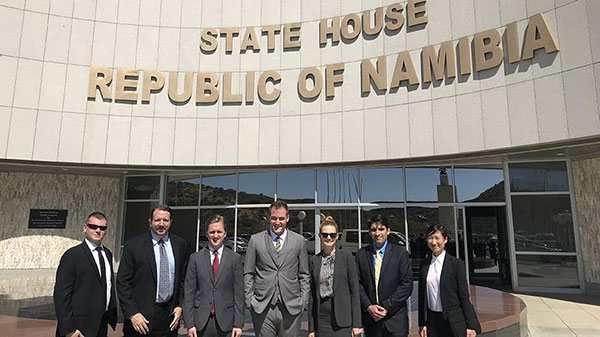
Master of Science in Finance students at Georgetown’s McDonough School of Business consulted this spring for the One Economy Foundation, a Namibian nonprofit that seeks to bridge the country’s two economies: the formal market-based sector that produces most of the country’s wealth and the informal, or subsistence, sector that relies on natural resources.
As part of their global consulting project, the students worked with One Economy to improve the foundation’s microfinance loan process and to examine policies to reduce the high income inequality in the Southern African country. The consulting projects included a trip to the capital city of Windhoek — marking Georgetown McDonough’s first engagement in Namibia — where they presented their recommendations to the foundation’s leadership, including the First Lady of Namibia Monica Geingos, at the State House.
Microfinance Loan Recommendations Focus on Repayment
One group of students worked specifically with the foundation’s ONE Nation Fund, which provides collateral-free loans. The fund was seeking ways to improve the loan process and reduce credit losses. MSF students developed a strategy to increase repayment rates through new loan structures, credit underwriting, and client support services.
The student team looked at successful microfinance operations for inspiration, including those with group loans to help clients build a credit history and leverage collective responsibility for repayment, and new technology that can generate efficiency and transparency, according to Lauren Leifeste (MSF'19). The students also recommended ways the fund can provide a clearer application process for customers as well as financial literacy training. “One Economy is extremely passionate about financial inclusion, so we wanted our recommendations to focus on driving repayment without creating processes or barriers,” Leifeste said.
Closing the Economic Inequality Gap and Encouraging Growth
Namibia has one of the highest rates of income inequality in the world. A second team of MSF students was tasked with recommending policies that might reduce this gap and, based on the team’s experience and expertise, focused on three areas: land reform, cash incentives, and educational resources.
The students analyzed Hawaii’s history to recommend similar laws and tax incentives to promote land reform, advocated for conditional cash transfers for citizens to use on children’s medical care and education, and advised ways that computer-based learning can reach students regardless of their physical location or availability of qualified teachers, according to Fei Cheng (MSF’19).
Embracing a Global Perspective
While the consulting projects provided students with an invaluable hands-on learning experience, traveling to Namibia and learning about the country and its culture also was educational.
“There is so much I didn't know about the history of Southern Africa and how that history has shaped the economy today,” said Leifeste. “Everyone really embraced the experience, from the client work to trying different food at the market, seeing lions and leopards at the animal sanctuary, and being confronted with poverty and inequality.”
Leifeste and Cheng noted that working with the One Economy Foundation was the perfect capstone to their MSF education and preparation for their own finance careers.
“One of the reasons I chose the MSF program was because of the global consulting project. The academics during the program are challenging, but the consulting project challenges you in other ways, and I think ultimately makes us better professionals,” said Leifeste, who now works in impact investing in Thailand, where she sources and manages debt investments in microfinance institutions across Southeast Asia.
“The MSF program emphasizes cultural awareness and promotes global thinking. Being able to think from a different perspective, forecast the next growth point, and identify new sources of economic growth is so critical to today's businesses,” said Cheng.
